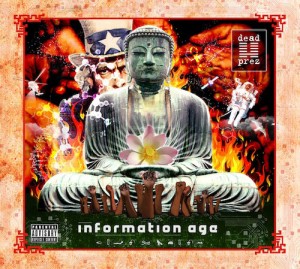In their best album since the groundbreaking debut Let’s Get Free, revolutionary hip-hop duo dead prez have released a masterpiece in Information Age. In the decade following Let’s Get Free, stic.man and M-1 have released some great singles amid some weaker material, but this album is a rock-solid return to form, a much-needed update to their radical message encoded in catchy beats and poetic lyrics.
Since their early days, dead prez have geared their artistic decisions toward using popular musical forms to spread their uncompromisingly revolutionary message to a wide audience. Let’s Get Free was a savvy blend of gangsta-rap bangers and soul-inspired tunes; Information Age, meanwhile, adapts recent trends in hip-hop and electro to incorporate bust-ya-shit-out dance beats and synthesized vocals. What has not changed is dead prez’s lyrical quality and flows, which are liquid, inspired, and inspiring. If something inside you has not changed by the time you finish listening to this album, then you probably need to check yourself.
The album’s concept speaks to the technological reality in which we find ourselves today. The intro track opens with a female-sounding computerized voice saying, “Uploading: Information Age.” The suspense builds as the futuristic auditory progress bar bleeds into the album’s first song, “A New Beginning.” The same female voice will end the album with an announcement that you are “Downloading.” The theme of digital upload/download works, I think, on two levels. First, it is a winking acknowledgement to the reality of the recording industry today: many of the people listening will have obtained the music, as I did, by downloading it for free on the Internet. Second, it is a not-so-subtle reminder that dead prez are uploading this album, full of practical, political and spiritual knowledge, into your brain. After you are finished listening/uploading, the idea is to download the knowledge to friends and comrades. The act completes the cycle of participatory education mentioned so often in dead prez lyrics: “each one teach one.” dead prez don’t really care about the “illegal” download—they want the knowledge to spread.
Before it recites a laundry list of the systemic problems staring this society in the face, the album’s first song, “A New Beginning,” dead prez reveal who they know to be at least part of their audience. “Try to save the trees / but you can’t go green / without that black and red / if we gon get free / we got to change that light bulb in our head.” They are reaching out to speak to young middle-class people across the nation who acknowledge the global ecological collapse we face, but who also, perhaps seeing the failure of the bullshit “go green” consumerist approach, are frozen in fear of the impending “end of the world.” But as the dead prez lyrically emphasize, we can choose to see collapse, the decay of the American empire, not as “the end of the world,” but instead as a “new beginning,” a perspective that more easily resonates with oppressed people who have been surviving the system all along: “They dollar’s losing value/ but the hood knew that already.” It is a cutting but hopeful sentiment, echoed later in the cut “Take Me To The Future,” that another world is possible which we must fearlessly build together: “Change is so necessary / cuz they system is not workin.”
This is not to say that dead prez optimism overrides the problems of the present. “What If The Lights Go Out,” for example, is eerily prescient of the devastation of Hurricane Sandy. It begins with a scene of two men stranded (on a rooftop?) as a helicopter passes overhead and one yells in vain hope of being rescued. The other man says “don’t do that man / you gon get shot … they aint comin to help us man / we got to help our motherfuckin self.” In comes stic.man, telling us how to do just that—to be ready for whatever: storms, financial collapse, power outages, martial law. (As I write, there are some still without power in Red Hook, NY, more than a month after Superstorm Sandy.) He tells us what to truly value: “organization, communication / clarity family solidarity,” adding, “The dollar bill is just a piece of paper / when the lights go out it aint gon save you.” A jab, perhaps, not only at the petit bourgeois chasers of the “American Dream,” but also the bling-bling money-worshiping rappers DP have regularly called out in past songs like “Hip Hop” and “Malcolm Garvey Huey.” In this song and a few others, M-1 brings an old-school hip hop sound to his raps, reminiscent of Grandmaster Flash in “The Message,” that grounds the electronic sounds in a hip-hop tradition. “This organized humanity / is borderline insanity, but / don’t panic, be cool / no code to the streets and no rules.”
In “Dirty White Girl,” dead prez warn all clean-living black revolutionary gentlemen to stay well away from the drug-addled white women who apparently frequent music industry circles trying to ensnare a sugar daddy. These toxic types allegedly hide their “white-power politic” beneath a haze of intoxication, malnutrition, and Lindsay Lohan-style antics. “Devil’s daughter / I don’t want her / She’ll have you strung out on the corner.” While at first I was a bit turned off by the song, which seemed mean-spirited toward these addicted women, subsequent listens reveal that the cuts are more directed at the substance abuse, the lack of regard they have for themselves, and their attempt to drag others into the pit of addiction. The song and attitude also reflect the Black Nationalist tradition of distrusting white women (and men) who try to connect with participants of black revolutionary movements. At the end of the song, dead prez acknowledge the prejudice of this tradition by having the computer voice recite the textbook statement: “The concept of race has no scientifically proven biological or genetic validity. It is a social construct that has been used as a tool of oppression for centuries.”
One of my favorites songs from the album, “No Way as the Way” alludes to a Zen Buddhist notion of “The Way.” The track opens with stic.man offering a narrative description his journey of spiritual discovery as a young person, from an early rejection of the Church (“Is it okay to question the pastor? / Was it passed down from the slave master?”), to an exploration of wisdom traditions of the African and Asian diaspora which coincided with training in martial arts and pursuit of proper fitness and nutrition, subjects he has earlier described in his excellent singles “The Way of Life” and “Back on My Regimen.” In “No Way as the Way,” the spiritual outlook evolves into one of principled, practical living: “My religion is Life and it’s just as valid / I strive for balance.” But stic.man acknowledges that this is only his journey, and we must learn to tolerate, or better, to celebrate, each person’s unique path. As he sings in the chorus: “My way might not be your way / But it’s okay / it’s alright.”
In the next verse, M-1 cuts in with some of the Big Questions: “I gotta admit I don’t know / In the end which way it’s gon go /… / Is there even a master plan / an unseen hand that’s god or man? / Some say that’s sacreligious / same folks tellin us lies about Christmas.” In a masterful line that expresses his solidarity and never fails to bring a tear to my eye: “They say God’ll take care of it, but you a terrorist if you say the same thing in Arabic.” The magnificent verse ends with a nod to the powerful revolutionary message found in slavery-era spirituals and the rich history of resistance: “Wade in the water and find out when Miss Tubman and Nat Turner ran for my freedom and headed for the border.”
There is so much more to say about the songs on this album, but I’m running out of time and space. Don’t miss “Learning Growing Changing,” a paean to participatory education over jazzy drums. “The Awakening” features the enchanting vocals of an anonymous African woman and the obligatory spoken word poem, this time delivered by Umar Bin Hassan of The Last Poets. And one of the jewels of the album, “Time Travel” is a vocoded electro-hiphop holistic pump-up song that will have you strapping on your exercise sneakers and dusting off your meditation cushion at the same time. Play this one loud and don’t be afraid to dance.
Let me tell you something. There might be haters out there who diss Information Age for its departure from what we have come to expect from dead prez. I say, haters gonna hate. As for me, I may have gotten Information Age for free off the Internet, but dammit I’m going over to CD Central ASAP to buy a copy—to show respect and support for the artists, but also to make it easier to spread this masterpiece to friends and comrades. This is proper propaganda; the timing could not have been better.




aboutathing
Brilliant album, bumped it all through the weeks that followed Sandy. It was from heaven at that time, it helped get me through it and remain calm and even help other people.. Thank you Dead Prez for another incredible album. I listened to the message in the spirituals.